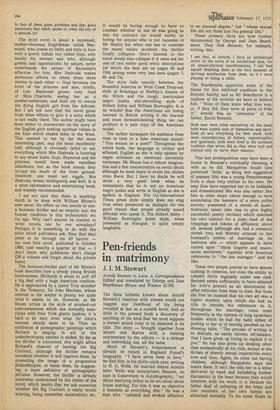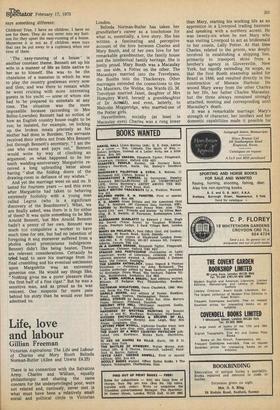Pen-friends in matrimony
J. I. M. Stewart
Arnold Bennett in Love: A Correspondence Edited and translated by George and Jean Beardmore (Bruce and Watson £2.50) The facts hitherto known about Arnold Bennett's relations with women would not suggest any likelihood of his being revealed at last as a notable lover. And so little is the present book a discovery of anything of the kind that we must suppose a certain muted irony to be intended in its title. The story — brought together from letters and diaries with a running commentary by the editors — is a strange and interesting one, all the same.
Much of Bennett's temperament is already on record in Reginald Pound's biography. "I have never been in love," we find him, in his thirty-ninth year, writing to H. G. Wells. He married eleven months later. Wells was unsurprised; Bennett, he says in Experiment in Autobiography, "Set about marrying rather as he set about about house hunting. For him it was as objective a business as everything else." He was a man who "radiated and evoked affection to an unusual degree," but "whose sexual life did not flood into his general life."
These primary facts are now further documented by George and Jean Beardmore. They find Bennett, for example, writing this: I see that, at bottom, I have an intellectual scorn, or the scorn of an intellectual man, for all sexual-physical manifestations. I can feel myself despising them at the very moment of deriving satisfaction from them, as if I were playing at being a child.
The Beardmores apportion some of the blame for this inhibited condition to the Bennett family; and as Mr Beardmore is a nephew of the novelist we have to believe him. "None of them knew what love was, or, if they did, they were at pains to hide it." Arnold was an ' extension ' of his father, Enoch Bennett: Both men were ruled exclusively by the head, both were utterly sure of themselves and sacrificed all and everything for their work, both were contemptuous of failure, unpunctuality, and ignorance, both were bred in the northern tradition that wives did as they were told and existed only to serve their masters.
This last predisposition may have been a factor in Bennett's eventually choosing a I wife as he did. Marguerite Soulie -(she preferred 'Solid,' as being less suggestive of peasant life) was a young Frenchwoman from a class very similar to his own. He may thus have expected her to be biddable and domesticated She was also rather like him in other ways: clever enough to have assimilated •the manners of a more polite society; possessed of a streak of quasihistrionic talent (she was to give highly successful poetry recitals) which matched his own instinct for a pose; fond of the trappings and tokens of affluence; above all, sensual (although she had a romantic streak too) and thereby attuned •to her husband's notion of marriage on its bedroom site — which appears to have turned upon "black lingerie and nouveautes nocturnes," together with facetious references to "the last outrages" and the like.
These two people proved to have almost nothing in common, not even the ability to cohabit fairly regularly under one roof. Bennett seems sufficiently to have admired his wife's powers as an elocutionist to offer criticism from time to time. But from the first he insisted that his own art was a higher mystery upon which she had no title to intrude; his references to it, throughout the marriage, come most frequently in the context of long epistolary tirades which he had the habit either of posting to her or of leaving perched on her dressing table. "The process of writing is so delicate, so easily thrown off-balance, that I have given up trying to explain it to you." He has also .given up sleeping other than monastically at his club, except at the dictate of .sheerly sexual imperatives every now and then. Again, he rules out having children, although Marguerite says she wants them. It isn't (he tells her in a letter delivered by hand and forbidding further discussion) in the least because they would Interfere with his work; it is because his father died of softening of the brain and two members of her own family are abnormal mentally. To his sister Sissie he Children! True, I have no children. I have no use for them. They do not enter into my horizon for they upset the easy-running of a house. Moreover it is not as if children were toys that can be put away in a cupboard when one tires of them.
'The easy-running of a house' is another constant theme. Bennett set up his wife in a manner of life as little native to her as to himself. She was to be the chatelaine of a mansion in which he was to play the country gentleman every now and then, and was there to remain while he went cruising with more interesting guests in his yacht — some of whom she had to be prepared to entertain at any time. The situation was the more impossible because (according to Mrs Belloc-Lowndes) Bennett had no notion of how an English country house ought to be run; he insisted, for example, on locking up the broken meats precisely as 'his mother had done in Burslem. The servants received their orders not from Mrs Bennett but through Bennett's secretary; "I am the one who earns and pays out," Bennett would write by way of clinching an argument; on what happened to be her tenth wedding-anniversary Marguerite received a long upbraiding letter about having "shut the folding doors of the drawing-room in defiance of my wishes."
And yet the marriage went on and on. It lasted for fourteen years — and this even after Marguerite had taken to behaving extremely foolishly with a young man called Legros (who is a significant discovery of the Beardmores'). What, we are finally asked, was there in it for either of them? It was quite something to be Mrs Arnold Bennett, but Mrs Arnold Bennett hadn't a penny cf her own. Bennett was much tca compulsive a worker to have much time for sex, but had no intention of foregoing it and moreover suffered from a phobia about promiscuous indulgences. Bennett didn't like being beaten. These are relevant considerations. Certainly he tried hard to save his marriage from its final crumbling and his eventual settlement upon Marguerite was an extremely generous one. He Would say things like, "Nothing gives me a purer pleasure than the first half of a fine cigar." But he was a sensitive man, and as proud as he was reticent. One suspects far more pain behind his story than he would ever have admitted to.

































 Previous page
Previous page